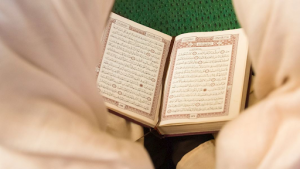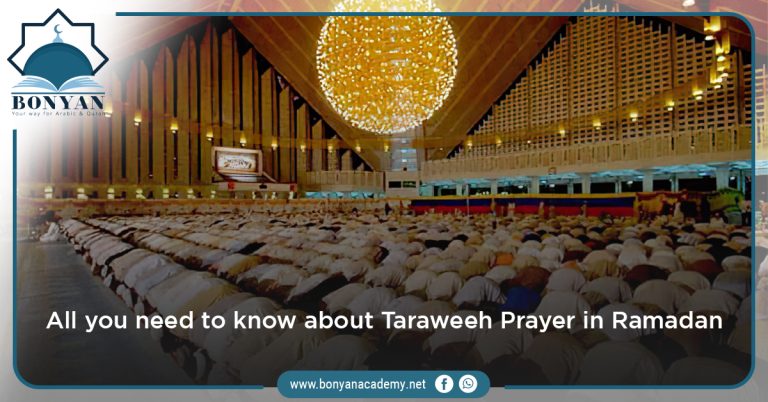All Muslims worldwide wait for the month of Ramadan throughout the year. This month comes with its blessings and virtues, so every Muslim tries their best to gain such blessings and rewards.
And Taraweeh Prayer is one of the ways to have a blessing during Ramadan. Thus many of us will need clear knowledge for praying Taraweeh.
In this guide, you will find what you need to learn how to perform Taraweeh Prayers. But let’s begin by answering the most frequently asked question about this prayer.
What is the meaning of Taraweeh?

The word “Taraweeh” is the plural of “tarawih” which means ‘resting’. The ‘resting’ here refers to sitting after every four rak’ahs.
Taraweeh prayer is Sunnah mustahabbah (recommended) according to the scholarly consensus that is performed after the Isha. It comes under the heading of “qiyaam al-layl” or (night prayers). It is supported by the evidence of the Quran and Sunnah which encourages “qiyaam al-layl” and describes its virtues.
Is Taraweeh prayer compulsory during Ramadan?
Islam has five compulsory prayers with Jumuah, with conditions of being performed in the time of Dhuhr on a Friday. Then, Prophet Muhammad – peace be upon him – advised us of certain sunnah prayers, some linked to compulsory prayers and then the late-night “witr” prayer.
As for Taraweeh, it is considered a commendable act. Prophet Muhammad (peace be upon him) led on occasion but for fear of it being made compulsory and did not do it every night.
However, Prophet Muhammad (peace be upon him) did it and his companions followed him in implementing this practice. It is considered commendable but not compulsory.
How many Rakaat is the Taraweeh prayer?
Taraweeh is a prayer that we Muslims pray in Ramadan, to enhance our prayers in number and spend our nights praying to God to distinguish Ramadan from other months.
Prophet Mohammed (P.B.U.H )Has taught us this prayer and claimed it to be a Nafal prayer (A prayer, not obligatory under any circumstance). However, you offer this prayer by your own will, and if you don’t wish to, there is no compulsion.
Also, the Prophet and his companions used to offer 20 Rakaat of Taraweeh. The question is can we offer 8, 12, or any other figure, other than 20?
My answer to that is yes because it is a Nafal prayer and Nawafil is offered by your own will, and there is never a compulsion on praying Nafl Prayers.
However, you cannot offer more than 20. This is because our Prophet or any other companion did not offer more than 20, and we cannot surpass them in any way.
Do we have to complete the Quran in the Taraweeh prayer?
Taraweeh is a recommended sunnah (practice), meaning that it was a practice of the Prophet Muhammad (S.W.T) which is considered to be very beneficial to Muslims.
The normal practice is to complete reading the Quran in 27/28 days of Taraweeh, meaning that you would pray a little more than a chapter of the Quran every night.
Some people complete the whole Quran in 10 days and then pray in very small units for the rest of the month.
So for the first ten days, it takes almost 4–5 hours per night, and then for the rest of the month, they put about 15–20 minutes to complete it.
Usually, Taraweeh takes about an hour. Also, It can be prayed alone but it is highly beneficial to pray it in a congregation. Every mosque has its way, as Some do very fast readings of the Quran. Some do it very slowly.
For example, In the UAE, Taraweeh is 8 Rakaat in most mosques and finishes in 10 minutes. In India, 20 Rakah takes about 1.5 hours.
How to perform Taraweeh Prayer?
The steps of the Taraweeh prayer are as similar as any other Nafl salah with the intention of Taraweeh.
You only need to follow the following steps to perform it correctly:
1- After the Isha prayer and two Rakaat sunnah, make a congregation. If you are alone, say it. The congregation is preferable, not compulsory.
2- Make an intention for two Rakaat salah Taraweeh or Qiyamul Layel. Both are the same, then say the two Rakaat salah/prayers as you say the other salah.
3- After offering the salah twice, have some rest. (Taraweeh means rest).
4- You can stop after 8 Rakaat ( 2×2, 2×2), but it is better to complete 20 Rakaat.
5- Recite Quran as much as you can during Taraweeh. If you don’t know much about the Quran or you haven’t memorized it, you may recite the last 10 small surahs twice (so 10 Rakaat, then 10 Rakaat completed).
And even if you don’t know them, recite whatever Quran you can. In most Muslim countries, the whole Quran is completed during the 29 days of Ramadan.
6- There is a dua/zikr during the rest period, but it is not compulsory. Taraweeh itself is not compulsory, but one should say it if he/she can.
Benefits of performing Taraweeh prayer

Taraweeh prayer is one of the remarkable things in Ramadan, that brings a lot of blessings from Allah (S.W.T). So the consistency in praying Taraweeh throughout Ramadan brings many virtues and rewards as follows:
1. Taraweeh prayer brings rewards for the entire night
We Muslims commit many sins in this life, and praying Taraweeh is our chance to get blessings and rewards from Allah the entire night.
So we should be keen to pray qiyaam al-layl in Ramadan in a congregation and to stay with the Imam until he finishes praying.
In this way, the worshiper will attain the reward for praying the whole night, even if he only spends a short part of the night praying. And Allah is the Owner of a great bounty.
2. Taraweeh prayer makes us listen to the Quran more often
Usually, the holy Quran is recited during Taraweeh in Ramadan. So Whether you perform Taraweeh behind the Imam or even in the comfort of your home, you will have the opportunity to listen and memorize parts of the Quran.
3. Taraweeh prayer enhances physical and emotional health
The gentle up and down movements during praying improve the physical and emotional health as well as the endurance of the person praying.
In short, the Taraweeh prayer is a blessing from Allah every Muslim must try offering regularly and not only during Ramadan. May Allah give us the power to perform Taraweeh in the holy month of Ramadan.









